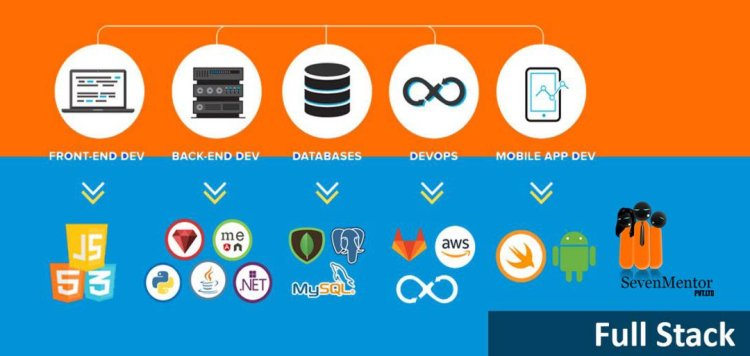What are the must-have skills for Full Stack developers in 2025?

To thrive as a Full Stack Developer in 2025, you need a solid foundation in both front-end and back-end technologies, along with additional skills in DevOps, cloud computing, security, and modern frameworks. Here’s a breakdown of the must-have skills:
1. Front-End Development Skills
- HTML5, CSS3, and JavaScript – The core technologies for building the structure, style, and interactivity of web pages.
- Modern JavaScript (ES6+) – Features like async/await, arrow functions, destructuring, and modules.
- Responsive Design – Skills in making applications work across all devices using Flexbox, Grid, and media queries.
- Front-End Frameworks – Master frameworks like React.js (most in-demand), Vue.js, and Svelte for building interactive and scalable UIs.
- TypeScript – Adding type safety to JavaScript code is a must for large-scale applications.
- CSS Preprocessors – Knowledge of SASS or LESS to write more maintainable CSS.
- UI/UX Design – Basic understanding of user-centered design principles to create intuitive user interfaces.
2. Back-End Development Skills
- Node.js & Express.js – JavaScript runtime and framework to build scalable server-side applications.
- Database Management – Master both SQL (PostgreSQL, MySQL) and NoSQL (MongoDB, Redis) databases.
- RESTful APIs & GraphQL – Understanding of designing and consuming REST APIs and implementing GraphQL for more flexible data fetching.
- Authentication & Authorization – Implement secure user authentication with OAuth 2.0, JWT, and session management.
- Cloud-Native Development – Familiarity with deploying apps on cloud platforms like AWS, Azure, or Google Cloud using serverless or containerized architectures.
3. DevOps & Deployment Skills
- CI/CD Pipelines – Knowledge of automated deployment tools like Jenkins, GitHub Actions, or GitLab CI for continuous integration and delivery.
- Containerization & Orchestration – Docker for containerizing applications and Kubernetes for orchestrating containers in production.
- Infrastructure as Code (IaC) – Tools like Terraform or AWS CloudFormation for managing infrastructure.
- Monitoring & Logging – Tools like Prometheus, Grafana, and ELK Stack to monitor applications and log events.
4. Cloud Computing & Serverless Architecture
- Cloud Platforms – Proficiency in platforms like AWS, Google Cloud, or Azure for scalable and efficient cloud-based applications.
- Serverless – Knowledge of serverless frameworks like AWS Lambda or Azure Functions to build scalable back-end services without managing servers.
- API Gateway & Load Balancing – Setting up and configuring API gateways, and load balancing to manage traffic.
Know more- Full Stack Classes in Pune
5. Security Best Practices
- OWASP Top 10 – Familiarity with common web security vulnerabilities (e.g., XSS, CSRF, SQL Injection) and how to mitigate them.
- HTTPS/SSL – Understanding how to implement secure connections and SSL/TLS certificates for safe data transmission.
- Data Encryption – Encrypting sensitive data both in transit and at rest (e.g., using AES or RSA).
- Authentication & Authorization – Deep understanding of OAuth, JWT, role-based access control (RBAC), and implementing multi-factor authentication (MFA).
6. Modern Tools & Technologies
- Version Control – Mastery of Git for source code management, along with platforms like GitHub or GitLab.
- WebAssembly (Wasm) – Familiarity with Wasm for performance-critical tasks in web apps, using languages like C, C++, or Rust.
- Progressive Web Apps (PWAs) – Creating app-like experiences using web technologies that can work offline and load quickly.
- Real-Time Web Apps – Integrating WebSockets (using Socket.io) or services like Firebase for real-time communication features (e.g., chat, live notifications).
7. Soft Skills
- Problem-Solving – Strong analytical skills to identify issues and quickly come up with solutions.
- Collaboration – Ability to work in cross-functional teams (working with designers, QA engineers, and product managers).
- Communication – Clearly articulate technical concepts to non-technical stakeholders and document code for future collaboration.
- Adaptability – Staying up-to-date with constantly evolving tech trends and tools.
8. Emerging Technologies
- AI & Machine Learning – Familiarity with integrating AI-driven features like chatbots, recommendation engines, or predictive analytics.
- Blockchain – Knowledge of blockchain concepts, smart contracts, and decentralized applications (dApps) for Web3 development.
- Edge Computing – Understanding how to deploy applications closer to the user with edge networks (using platforms like Cloudflare Workers).
Know more- Full Stack Developer Course in Pune
What's Your Reaction?



















